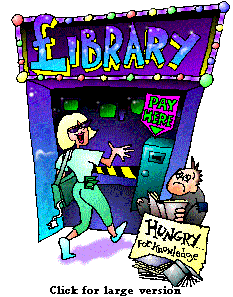Charging Ahead?
Librarians in Higher Education will become market-oriented product and service developers operating in a partially commercial environment within the next few years, according to Richard Lucier, Librarian of the University of California at San Francisco. He believes that libraries can no longer afford to subsidise full access to information for all users.
Lucier's Follett Lecture, presented at Leeds in June, described how his library had coped with major cuts in central funding, accompanied by significantly higher prices for scientific information. Charging users directly for some services has become essential, he argues. External users of the library at UCSF pay to view the special collections, for training sessions in library use and for a growing array of other library services traditionally provided free to patrons.
 In 1991, 90% of the library's funding was received centrally from the university. Now, that proportion has fallen to 75%, and by 1999 it may be as low as 50%. Librarians need to be hard-headed about the way they make their services available. "Ask yourselves who your primary clients are, what their information needs will be and what technologies will satisfy those needs" said Lucier. The stress is on the word needs. "We don't do anything any more because it's nice to do".
In 1991, 90% of the library's funding was received centrally from the university. Now, that proportion has fallen to 75%, and by 1999 it may be as low as 50%. Librarians need to be hard-headed about the way they make their services available. "Ask yourselves who your primary clients are, what their information needs will be and what technologies will satisfy those needs" said Lucier. The stress is on the word needs. "We don't do anything any more because it's nice to do".
Lucier argues that there is no intrinsic conflict between charging and service - after all, information services were never really free before. "The choice is to charge or to cut back on services to our primary clientele". Charging for services, he noted, can lead to higher customer expectations and improved service.
Yet Lucier is passionate about the value of libraries. "We must distinguish ourselves with unexpected service". He cited examples of such service provided by certain department stores. Libraries need to emulate these, "putting the customer first", and to engage in product marketing. "We need intuitive products which form an integral whole."
An example is UCSF's GALEN II digital library service, which provides access to current journal articles, and services like Medline, through a Web interface. It has been well received by academics, partly because of its convenience for those who work from home and partly because they find it easy to use. The only complaint mentioned by Lucier was that, once they'd tried it, the academics wanted all journals to be available this way. The aim with GALEN II is to provide something which is as logically laid out as a well-planned library building.
Lucier's library is publishing parts of its special collections in various formats, and beginning to charge users for access. An example is its collection of tobacco industry documents, which is in constant demand. The commercialisation of such a collection opens it up as a resource to users far beyond the academic world. The library also provides an AIDS information service. This raises a potential ethical dilemma which Lucier acknowledges. Should it charge AIDS sufferers? Policy is still in formation. "We shall work to balance health promotion for the public with the need to generate funds."
Finally, Lucier has confidence that universities and their libraries are more powerful than they imagine, and should utilise their bargaining powers in dealings with publishers. At UCSF, academics are reconsidering assignment of intellectual property rights to publishers, and are taking active steps in the multimedia arena to maintain and exploit these rights. The Library is rejecting the high prices being set for access to electronic versions of journals. Lucier urges other librarians to do likewise. "Don't accept these initial terms - they will set precedents." It is a message which some of his users may find ironic.
